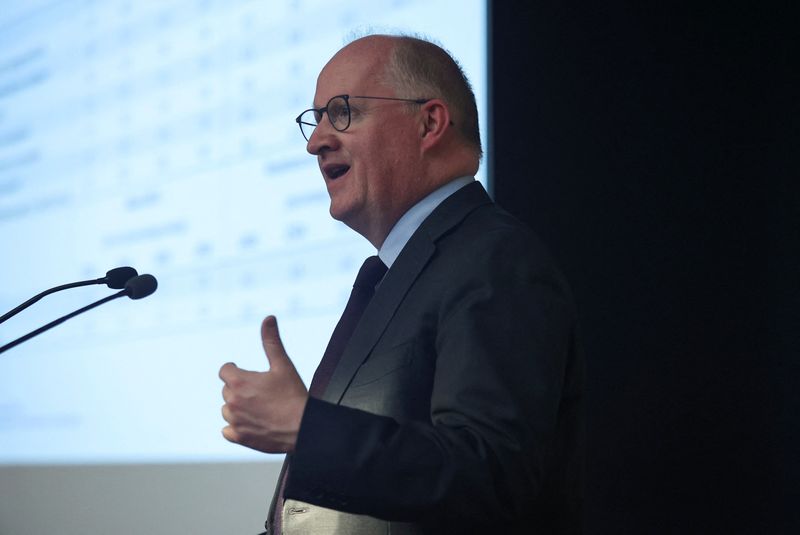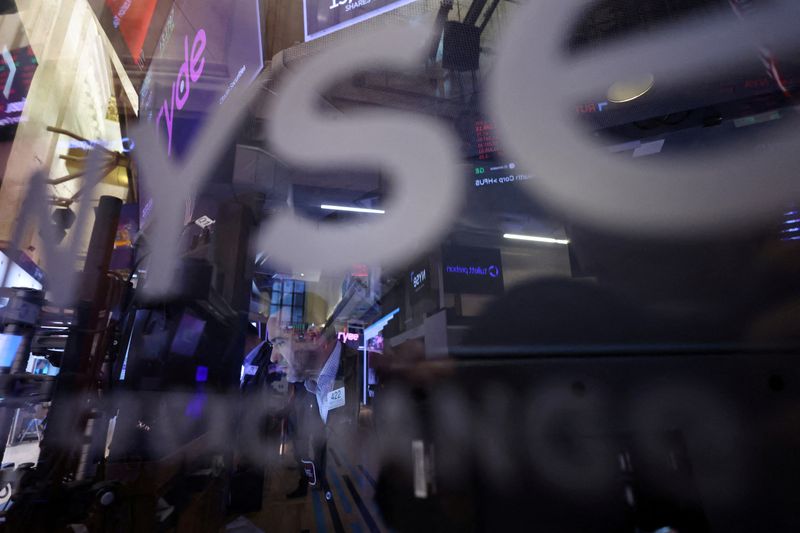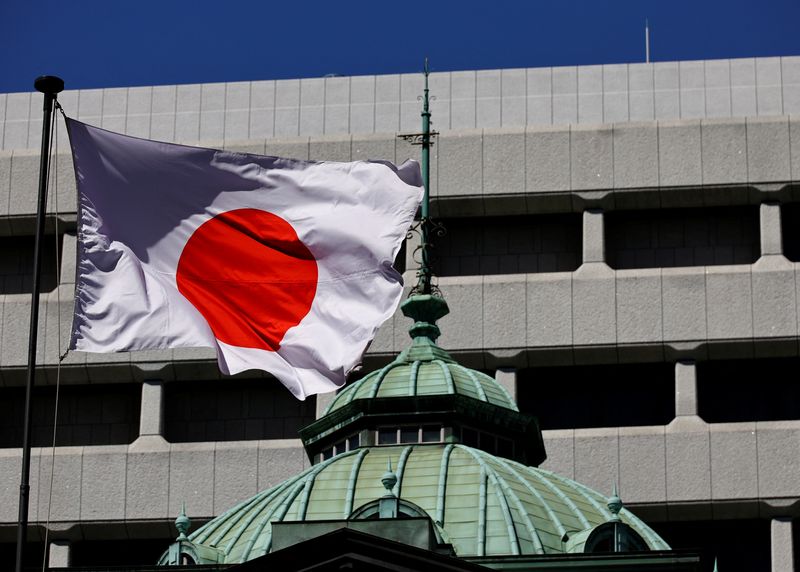Select Language

TOKYO (Reuters) - Japanese corporate services prices in April rose at their fastest pace since early 2015, Bank of Japan data showed on Tuesday, boosted by labour costs in the services sector.
The Corporate Services Price Index (CSPI) rose 2.8% year-on-year in April, following a 2.4% increase in the previous month. For the month, the service prices rose 0.7% from March, slowing from the prior month's 0.9%.
The annual gains reflect rising labour costs in labour-intensive service businesses such as machine repair and industrial facility renovation.
The index is closely watched by policymakers as they look for solid wages to spark durable demand-led inflation, which is a prerequisite for further Bank of Japan rate hikes after its landmark decision in March to end negative rates.
The BOJ has signaled it will continue to raise interest rates albeit at a sedate pace given the fragile state of the Japanese economy.
TOKYO (Reuters) - Japanese corporate services prices in April rose at their fastest pace since early 2015, Bank of Japan data showed on Tuesday, boosted by labour costs in the services sector.
The Corporate Services Price Index (CSPI) rose 2.8% year-on-year in April, following a 2.4% increase in the previous month. For the month, the service prices rose 0.7% from March, slowing from the prior month's 0.9%.
The annual gains reflect rising labour costs in labour-intensive service businesses such as machine repair and industrial facility renovation.
The index is closely watched by policymakers as they look for solid wages to spark durable demand-led inflation, which is a prerequisite for further Bank of Japan rate hikes after its landmark decision in March to end negative rates.
The BOJ has signaled it will continue to raise interest rates albeit at a sedate pace given the fragile state of the Japanese economy.

By Kanishka Singh
(Reuters) -Tornado-spawning thunderstorms that swept the Southern Plains and the Ozark Mountains have killed at least 21 people across four U.S. states as of Monday afternoon and wrecked hundreds of buildings, as forecasters warned of more severe weather.
The death toll over the three-day Memorial Day holiday weekend included at least eight fatalities in Arkansas, seven in Texas, four in Kentucky and two in Oklahoma, according to tallies by state emergency authorities.
A severe thunderstorm watch was issued for parts of New Jersey, New York and Pennsylvania until Monday evening, the National Weather Service said. The watch was in effect for more than 30 million people in the Northeast, as the storms were expected to move to that part of the East Coast.
Kentucky Governor Andy Beshear declared a state of emergency early on Monday. The weather service issued a severe thunderstorm watch for the Atlanta area and other parts of Georgia and for several western South Carolina counties until at least Monday afternoon.
"It was a tough night for our people," Beshear posted on social media platform X on Monday. He later said in a press briefing that devastating storms had hit almost the entire state. The storms damaged 100 state highways and roads, officials said.
At least seven people perished - including a 2-year-old and a 5-year-old from a family - and nearly 100 were injured on Saturday night when a powerful tornado struck communities in North Texas near the Oklahoma border, Governor Greg Abbott told a Sunday news conference.
Late on Sunday, Arkansas Governor Sarah Huckabee Sanders said at least eight people died in her state after the storms. An Arkansan suffering from chronic obstructive pulmonary disease died due to a lack of oxygen when the power went out.
President Joe Biden offered condolences for the lives lost when he spoke on Monday with Oklahoma Governor Kevin Stitt and Governors Abbott and Sanders, the White House said.
The Federal Emergency Management Agency was on the ground conducting damage assessments with state and local counterparts, the White House said, adding that Biden had directed federal agencies to provide support as needed.
Hundreds of thousands of Americans were without power on Monday due to the weather, according to the PowerOutage.US tracking website. In Kentucky alone, more than 160,000 customers lacked electricity.
In some areas, restoring power could take days, Kentucky Governor Beshear said in a news briefing.
The weather service warned that additional storms would move through the Ohio and Tennessee valleys, bringing damaging winds, large hail and more tornadoes, as well as heavy downpours capable of triggering flash floods.
The latest extreme weather came just days after a powerful tornado ripped through an Iowa town, killing four people, and more twisters touched down in Texas last week.
The U.S. is preparing for what government forecasters have called a potentially "extraordinary" 2024 Atlantic hurricane season beginning next Saturday.

(Reuters) -The European Central Bank is ready to cut interest rates next month but policy must continue to be restrictive this year as wage growth will not normalise until 2026, ECB chief economist Philip Lane told the Financial Times.
The ECB has all but promised a rate cut for June 6, so the debate has shifted to subsequent moves and markets have dialled back their expectations, betting on just one more cut this year.
"Barring major surprises, at this point in time there is enough in what we see to remove the top level of restriction," Lane told the FT in an interview published on Monday.
"The best way to frame the debate this year is that we still need to be restrictive all year long," he added. "But within the zone of restrictiveness we can move down somewhat."
While Lane made no explicit comment about the July policy meeting, a string of policymakers including fellow board member Isabel Schnabel have already said that a second step should not come quite so soon.
Wage growth is expected to "visibly" decelerate next year and policymakers can then debate normalising policy.
At 4%, the ECB's deposit rate holds back growth and there is little debate that the first few cuts, at least until 3% but possibly further, merely remove restriction rather than provide stimulus.
"We need to see more progress (on inflation) before we move from maintaining the restrictive phase to thinking about normalisation," Lane added.
Lane said ECB policymakers needed to keep rates in restrictive territory this year to ensure that inflation kept easing and did not get stuck above the bank's target, which "would be very problematic and probably quite painful to eliminate".
A key wage indicator accelerated last week, spooking some but Lane said the figure was well anticipated and a slowdown was already in the works.
"Deceleration does not necessarily mean an immediate return to steady state," Lane said. "This year the adjustment is clearly quite gradual."

By Vivek Mishra
BENGALURU (Reuters) - India's economy likely grew at its slowest pace in a year in the January-March quarter due to weak demand, according to a Reuters poll of economists who said the possibility of growth significantly surpassing their forecasts was low.
The country's gross domestic product (GDP) unexpectedly grew by 8.4% in October-December compared to a year earlier, thanks to a sharp drop in subsidies which provided an artificial boost to net indirect taxes. But economic activity, as measured by gross value added (GVA), showed a more modest 6.5% expansion.
Economists in the poll said that situation was unlikely to have been repeated in the last quarter.
Growth in Asia's third-largest economy likely slowed to an annual 6.7% in January-March, more in line with the long-term GDP growth rate, according to a Reuters poll of 54 economists. GVA growth was expected to slow to 6.2%.
Most economists in the poll said growth likely slowed due to moderation in both the manufacturing and services sectors. They also cited a muted contribution from agriculture.
Forecasts for GDP growth were in a 5.6%-8.0% range. The data are due at 1200 GMT on May 31, just days before general election results will be announced on June 4. Prime Minister Narendra Modi is expected to win a rare third term in power.
"We expect some sanity to return," said Kunal Kundu, India economist at Societe Generale (OTC:SCGLY). "Among the components, we do not expect any major improvement."
Over two-thirds of economists who answered an additional question said the possibility of GDP growth significantly surpassing their forecast was low. The rest said it was high.
"Core inflation continuing to drop and recording the lowest growth since the onset of the pandemic is symptomatic of weak domestic demand," Kundu said.
Weaker growth in private consumption, which accounts for 60% of GDP, was also likely to appear in upcoming quarters.
Economic growth, which likely averaged 7.7% last fiscal year, was forecast to slow to 6.8% this fiscal year and 6.6% in the next, suggesting consistent 8% growth was still some distance away for the world's fastest-growing major economy.
While most economists reckon 8% or higher growth is needed to generate adequate job growth for millions of young people joining the work force, some are skeptical that can be consistently achieved.
Miguel Chanco, chief emerging Asia economist at Pantheon Macroeconomics, said 5-6% was a "reasonable" potential growth rate for India's economy.
"For this potential to be reaped, though, reforms need to be pursued, and Modi 2.0 took some steps back on this front - a reversal of agriculture reforms, delay in the implementation of new labour codes and a broad turn away from regional trade agreements."
A growing divergence between financial economists' GDP forecasts and government estimates has also raised questions over how India measures growth.
The National Statistical Office (NSO) said it expected GDP growth to be 5.9% in the January-March quarter.
"I think there is a slight overestimation of the informal sector GDP...which is why things on the ground probably do not look as exuberant as the headline numbers suggest," said Dhiraj Nim, economist at ANZ.
The informal sector contributes nearly half of the country's GDP and employs about 90% of India's workforce.

By Gavin Jones, Giuseppe Fonte and David Lawder
STRESA, Italy (Reuters) - The G7 will explore ways to use the future income from frozen Russian assets to boost funding for war-torn Ukraine, finance chiefs from the Group of Seven industrial democracies said on Saturday, but offered no details of how to do so.
The G7 and its allies froze some $300 billion of Russian financial assets, such as major currencies and government bonds shortly after Moscow invaded its neighbour in February 2022.
"We are making progress in our discussions on potential avenues to bring forward the extraordinary profits stemming from immobilized Russian sovereign assets to the benefit of Ukraine," the G7 said at the end of a two-day meeting in northern Italy.
Financing for Ukraine and meeting China's growing export strength were the main themes addressed in comments from finance ministers during the gathering in the lakeside town of Stresa.
The United States has been pushing its G7 partners - Japan, Germany, France, Britain, Italy and Canada - to back a loan that could provide Kyiv with as much as $50 billion in the near term.
However, the cautious wording of the statement, containing no figures or details, reflects many legal and technical aspects which need hammering out before such a loan could be issued.
The issue will now be discussed by G7 leaders at a summit in southern Italy in mid-June.
"We are not yet ready to find further and clear measures to finance Ukraine, but this is now a topic of intensive work," German Finance Minister Christian Lindner told reporters.
Russian Finance Minister Anton Siluanov said Moscow would reciprocate if the G7 went through with its threat. His government has already taken control of some Western businesses active in Russia.
U.S. Treasury Secretary Janet Yellen said a loan to Kyiv was only "the main option" for G7 leaders to consider next month, but she didn't want to "take anything off the table as a future possibility."
G7 negotiators have been discussing for weeks how to best exploit the assets, which are mostly held in European-based depositories, and all the European Union's 27 countries will have to sign off on any agreement.
"It's not a given, so I'm not saying this is a totally done deal," Yellen said.
UKRAINE'S "DESPERATE NEED"
The G7 ministers and central bankers were joined on Saturday by Ukraine's Finance Minister Serhiy Marchenko, whose country is struggling to contain a Russian offensive in the north and the east, more than two years after Moscow first invaded.
Italian Economy Minister Giancarlo Giorgetti, who hosted the Stresa meeting, told reporters a loan would aim to support Ukraine's budget for the next 2-3 years and would not be used for weapons as this was forbidden by Japan's constitution.
He added that it could possibly be administered by the World Bank or else an ad hoc body.
Giorgetti said Marchenko had told the gathering Ukraine had a "desperate need" of financing.
"Consistent with our respective legal systems, Russia's sovereign assets in our jurisdictions will remain immobilized until Russia pays for the damage it has caused to Ukraine," the G7 statement said.
The European Union on Tuesday finalised its own deal to help Ukraine using the "unexpected and extraordinary" profits earned by the Russian assets in Europe, expected to yield 15-20 billion euros ($16-22 billion) by 2027.
The latest U.S. proposal is that Washington could provide a lump sum loan to Ukraine, to be paid back through the revenue stream from these assets, a G7 official said.
CHINA CRITICISM
China's growing export strength and what G7 ministers call its industrial "overcapacity" was a major issue in Stresa.
"We express concerns about China's comprehensive use of non-market policies and practices that undermines our workers, industries, and economic resilience," the statement said.
"We will continue to monitor the potential negative impacts of overcapacity and will consider taking steps to ensure a level playing field, in line with World Trade Organization (WTO) principles."
The United States last week unveiled steep tariff hikes on an array of Chinese imports including electric vehicle batteries, computer chips and medical products.
Washington has not called on its allies to take similar steps but Yellen said this week she wanted the G7 to express a "wall of opposition" to China's industrial and trade policies.
Giorgetti said EU countries now had to decide whether to follow the U.S.' lead in using tariffs to curb Chinese imports. There are "different points of view" on the issue, he noted.
On taxation, the 13-page G7 statement also said the G7 aimed to sign off on the first pillar of an accord on a global minimum tax rate for multinationals by the end of next month, but Giorgetti said this was all but impossible.
Hopes of a deal within the planned time scale were "almost dead," he said.
This first pillar aims to reallocate the taxing right on mainly U.S.-based digital giants, allowing about $200 billion of corporate profits to be taxed in the countries where the companies do business.
The G7 finance leaders also reaffirmed their exchange-rate commitment warning against excessively volatile and disorderly currency moves, nodding to a request by Japan.
Tokyo has argued this G7 agreement gives it freedom to intervene in the currency market to counter excessive yen moves.
The G7 also called on Israel to maintain correspondent banking links between Israeli and Palestinian banks to allow vital transactions, trade and services to continue, according to the draft.

By Michel Rose and Sarah Marsh
PARIS/BERLIN (Reuters) - French President Emmanuel Macron landed in Germany on Sunday for a three-day state visit followed by a bilateral cabinet meeting as the European Union's two biggest powers seek to show unity ahead of next month's EU parliamentary elections.
Macron's trip to the capital Berlin, Dresden in the east and Muenster in the west is the first French presidential state visit to Germany in 24 years.
The visit will be watched as a checkup on the health of the German-French relationship that drives EU policymaking, at a time of major challenges for Europe - from the Ukraine war to the possible election of Donald Trump as U.S. president in November.
"This state visit comes at a key moment for Europe," Macron said, pointing to the war in Ukraine among other challenges. "We have to face an imperialist desire in Europe ... this supposes boosting the Franco-German relationship," he told journalists after he was received by his German counterpart Frank-Walter Steinmeier at the presidential palace, Schloss Bellevu.
Steinmeier, who holds a largely ceremonial role, said Germany and France can get through the geopolitical challenges Europe is facing, such as Russia's war in Ukraine, the war in Gaza, and the U.S. presidential election if the two countries work together.
Macron and German Chancellor Olaf Scholz have very different leadership styles and have publicly clashed on issues from defence to nuclear energy since the latter took power in late 2021. However, they have reached compromises on various fronts of late, from fiscal reform to changes to power market subsidies, allowing the EU to strike deals, and put on a more united front.
"There are tensions in the German-French relationship but in part precisely because they have dealt with some difficult topics," said Yann Wernert at the Jacques Delors Institute in Berlin, noting the two countries had also converged on the need to expand the EU eastwards.
The visit is "an attempt at the highest political level to demonstrate that the relationship is working," said Mujtaba Rahman, managing director for Europe at the Eurasia Group think tank. "But there are still fundamental gaps on major questions that are looming over the EU."
One key such gap is on European defence, in particular if Trump wins the Nov. 5 U.S. presidential election. Defence experts view him as a much less predictably reliable ally for Europe than his Democratic rival, President Joe Biden.
Earlier this year the Republican former president not only said he would not protect NATO members from a future attack by Russia if those countries' contributions to the defence alliance were lagging, but that he would encourage Russia "to do whatever the hell they want."
France, which has nuclear weapons, has pushed for a more self-reliant Europe on defence matters and has been aggrieved by Germany’s decision to buy mostly American gear for its European Sky Shield Initiative air defence umbrella.
Germany says there is no credible alternative to the U.S. military umbrella and that Europe does not have time to wait for a homegrown defence industry to be prepared for threats such as Russian hostility.
POMP AND BUSINESS
After meeting Steinmeier, Macron, accompanied on his trip by his wife Brigitte, will walk through the landmark Brandenburg Gate with the city's mayor, Kai Wegner.
On Monday, he will head to Dresden, where he will make a speech in front of the Frauenkirche which was destroyed by Western allies during the Second World War, before heading on Tuesday to Muenster.
But perhaps the most significant part of his trip will be the cabinet meeting on Tuesday in Meseberg, just outside Berlin, where the two governments will then get down to business seeking to find common ground on the two main issues they have struggled to see eye-to-eye on, namely defence and competitiveness.
The two countries will also try to find common ground on the EU agenda for the next five years, in view of the expected strong showing for the far-right in the parliamentary elections on June 6-9, making EU decision-making more difficult.
Rahman said the EU would have a clear window to push forward with more ambitious plans - between the parliamentary elections and establishment of the new leadership, and next summer before the German elections. This would be especially important if Trump won the election, he said.

Investing.com -- Inflation data out of the U.S., the euro zone and Japan will be front and center in the holiday-shortened week ahead. The health of China’s manufacturing sector will also be in the spotlight, while concerns over the demand outlook may continue to weigh on oil prices. Here's your look at what's happening in markets for the week ahead.
U.S. inflation data
The Fed’s favourite inflation gauge - the personal consumption expenditures (PCE) price index - due on Friday will be closely watched for clues about the direction of interest rates over the rest of the year.
The data comes as markets are becoming resigned to the higher-for-longer interest rate narrative after last weeks Fed minutes, along with cautious sounding remarks from policymakers who expressed doubt whether inflation is indeed on a reliable downward trajectory.
Investors will also get the chance to hear from several Fed speakers during the week including Governor Michelle Bowman, Cleveland Fed President Loretta Mester, Governor Lisa Cook, New York Fed President John Williams and Atlanta Fed President Raphael Bostic.
The economic calendar also features revised data on first quarter economic growth on Thursday and the Fed’s Beige Book on Wednesday.
Euro zone inflation
The European Central Bank has all but promised to lower interest rates from a record high of 4% in at its upcoming June meeting, but it remains to be seen how quickly it will cut rates after that, particularly if inflation data out on Friday shows price pressures remain volatile.
Economists expect euro zone inflation to tick up 2.5% in May year-on-year, from 2.4% in April, while underlying inflation is seen holding steady at 2.7%.
This alone is unlikely to deter the ECB from cutting in June but some officials are already arguing against the need to ease any further.
The economic calendar for the bloc also features Germany’s Ifo business climate index on Monday, and the ECB’s survey of inflation expectations on Tuesday.
Japan data
Tokyo inflation data due on Friday will be closely watched as markets try to gauge when the Bank of Japan could next raise rates.
The figures come two weeks before the BOJ's next monetary policy meeting, where some are betting the central bank could deliver its second rate rise after March's historic move.
Policymakers are facing mounting pressure to hike rates amid ongoing weakness in the yen which hurts consumption by inflating the cost of raw material imports.
Also Friday, the Ministry of Finance is to release intervention data which covers the recent rounds of suspected intervention and the BOJ's bond buying schedule, where traders will look out for cuts in the amount of central bank purchasing.
China activity
China is to release data on industrial profits for the year to date on Monday with market watchers eager to see whether profits rebounded in April after a sharp decline the prior month slowed the pace of gains for the first three months to 4.3%.
China is to release its official manufacturing and non-manufacturing PMIs on Friday. Economists are expecting the manufacturing index to remain just above the 50 threshold that separates growth from contraction for a third month in May.
Beijing has set an ambitious economic growth target of around 5% for this year, which many analysts say will be a challenge to meet as prolonged weakness in the property sector and tepid consumer demand remain a drag on the world’s second largest economy.
5. Oil prices
Oil prices rose about 1% on Friday but posted a weekly loss on worries that strong U.S. economic data would keep interest rates elevated for a longer period, curbing fuel demand.
Brent closed down 2.1% for the week. It declined for four straight sessions last week, its longest losing streak since Jan 2. U.S. crude settled down 2.8% for the week.
Higher interest rates increase the cost of borrowing, which can slow economic activity and dampen demand for oil.
Oil demand is still robust from a broader perspective, analysts at Morgan Stanley wrote in a note, adding they expect total oil liquids consumption to increase by about 1.5 million barrels per day this year.
Soft U.S. gasoline demand has been offset by global demand, which surprised to the upside, especially in the early parts of the year, the analysts said.
--Reuters contributed to this report

By Swati Bhat and Aftab Ahmed
MUMBAI/NEW DELHI (Reuters) - India's incoming government will be greeted with a $25 billion cheque from the central bank, giving it the option to either boost spending or narrow the fiscal deficit quicker, both of which will be cheered by investors.
On Wednesday, the Reserve Bank of India (RBI) announced a record 2.11 trillion rupees dividend transfer to the government, more than double New Delhi's and street estimates, leading to a decline in bond yields and a rise in equity markets.
The surplus fund can help the new government, which will take charge after the current elections, bring down its fiscal deficit by 0.3% of gross domestic product (GDP) or increase spending on infrastructure or "populist" stimulus, Citi Research's Samiran Chakraborty said.
"The bond markets would likely hope that the government follows the deficit reduction route, while the equity markets would likely prefer the government taking the expenditure increase one," said Chakraborty.
During the election campaigns, the opposition Congress promised annual cash handouts of 100,000 rupees ($1,202.07) to poor women and unemployed youth. The party's star campaigner Rahul Gandhi also promised debt waiver for farmers.
But Prime Minister Narendra Modi of the Bharatiya Janata Party (BJP) has avoided promising any new major welfare measures.
"Despite higher revenue from the RBI dividend, we doubt the government would opt for more populist expenditure in its budget, if the government is BJP-led," said Shreya Sodhani, an economist at Barclays.
"The current government has not shown a disposition towards populist spending even in an election year."
The BJP-led government resisted the temptation of spending trillions of rupees on schemes for the poor in its last budget before the election while raising spending on infrastructure to 11.11 trillion rupees, more than three time the sum spent in 2019.
QUICKER FISCAL CONSOLIDATION
The new government will likely present the final budget in July, leaving the administration with only eight months to spend funds allocated to them.
Government spending has been slow so far in the year, with the start of elections from April. Tax collections, meanwhile, have been strong due to buoyancy in the economy.
India collected a record 2.10 trillion rupees in goods and services taxes in April, the first month of the financial year, ensuring the government is on track to meet its planned fiscal goal of 5.1% of GDP this year.
This could mean the government will lean towards using the bumper dividend for fiscal consolidation.
There is scope for a slight reduction in the targeted fiscal deficit for the current year, said Ashima Goyal, a professor and an external member of the country's monetary policy committee, who expects the government to comfortably achieve the targeted fiscal deficit of 4.5% by 2025/26.
India's fiscal deficit ballooned to 9.2% during the pandemic but the government has steadily brought this down.
But bringing down the deficit by 130 basis points from 5.8% in 2023/24 was seen as challenging and dependent on one-off revenue from either privatisation or auction of telecom spectrum.
($1 = 83.1900 Indian rupees)

By Satoshi Sugiyama
TOKYO (Reuters) -The Bank of Japan will decide to start tapering the size of its bond-buying by end-July, according to nearly two-thirds of economists polled by Reuters, while close to 90% forecast an interest rate hike to at least 0.20% by the end of the year.
The findings reflect forecasters' stronger conviction that the BOJ will gently tighten policy even as most other major central banks look toward easing.
Although the Japanese central bank ended negative rates in March, it has stuck to its guidance of buying roughly 6 trillion yen ($38.3 billion) per month of government bonds to avoid sudden spikes in yields.
However, the BOJ is facing growing political pressure to slow the yen's decline, blamed for squeezing households through higher import costs, and being compelled to take action such as slowing bond purchases and raising interest rates.
Forty-one percent of economists, or 11 of 27, predicted the BOJ would make a decision on bond-buying reduction as early as the June meeting, while another 22% said July, the May 16-22 poll found.
"The decision to start (bond purchase reductions) in the early stages of normalisation is already seen as a consensus among policymakers and appropriate in terms of reducing additional yen depreciation pressure," said Ayako Fujita, chief Japan economist at JPMorgan Securities.
Three economists opted for September, while another three said the bank would wait until 2025 or later.
The BOJ made an unannounced cut last week to the amount of Japanese government bonds it offered to buy in a regular purchase operation and Japan's 10-year government bond yield crossed 1% for the first time in 12 years on Friday, with expectations of further policy tightening.
While all but one of the 54 economists in this month's poll predicted the next interest rate hike would not take place in June, 88% (or 43 of 49) responded the policy rate would increase to at least 0.20% by year-end, up from 65% in the April poll.
Specifically, 47%, or 25 of 53, said borrowing costs would rise to between 0.20% and 0.35% in the July-September quarter. Another 41% of economists, 20 of 49, forecast that the BOJ will raise rates to either 0.20% or 0.25% in the October-December period.
Seven economists who expected a rate increase next quarter also saw the policy rate being lifted to either 0.30% or 0.50% in the three months to December.
"The BOJ needs to show their ability to raise the policy rate to stem a rapid depreciation of the yen, even if they have little room in reality," said Chiyuki Takamatsu, chief economist at Fukoku Mutual Life Insurance.
The median forecast showed the upper end target of the overnight call rate, currently at 0.10%, would be raised to 0.50% by the April-June quarter of next year, compared to the October-December quarter of 2025 predicted in the April poll.
Of a sample of 33 economists who provided a forecast for which month the BOJ would next hike rates, October was the top pick with 39%, followed by July with 27% and 15% in September.
The yen's fall to a 34-year low against the U.S. dollar last month triggered a suspected round of intervention by Japanese authorities and piled pressure on the BOJ to tilt its policy stance more towards the hawkish spectrum.
In the poll, 85% of economists, or 22 of 26, said the government and BOJ will intervene to stem the Japanese currency from weakening further, down from 91% in April.
Nearly three-quarters, or 16 of 22, who answered a follow-up question, said they expected action if the yen declined to 160 against the dollar.
(For other stories from the Reuters global economic poll:)
($1 = 156.5900 yen)

By Marcela Ayres and Bernardo Caram
BRASILIA (Reuters) - A minimum tax on billionaires is likely to gain wider traction among the G20 group of the world's largest economies as they get clarity on the proposal, French economist Gabriel Zucman of the independent European Union Tax Observatory said in an interview on Wednesday.
Zucman, an architect of the proposal, is preparing a report for the G20 finance ministers in July at the request of Brazil, which is chairing this years' meetings. He showed optimism about progress on the idea, presented by Brazil just three months ago.
"The hope is to have a declaration (in July) by a number of countries, as many countries as possible, on taxation," Zucman said ahead of a research symposium in Brasilia on Thursday to discuss proposals for the global minimum wealth tax.
France, Spain, Colombia, Belgium and the African Union have expressed support for the idea, along with South Africa, which will assume the G20 presidency next year.
"I am deeply moved to see how quickly this proposal has gained traction," Brazilian Finance Minister Fernando Haddad told the symposium in Brasilia on Thursday.
Zucman said studies have shown a 2% minimum annual tax on roughly 3,000 individuals with at least $1 billion in wealth could raise about $250 billion per year. His G20 report will include variations including other tax rates or a broader base of contributors, such as fortunes over $100 million.
Zucman suggested a system akin to the global minimum tax on multinational corporate profits, allowing governments to levy extra taxes on companies from non-participating nations. With that framework, he said, the policy could be effective even without a specific minimum number of countries adopting it.
U.S. Treasury Secretary Janet Yellen this week rejected the idea of a global arrangement for taxing billionaires and redistributing proceeds, according to the Wall Street Journal.
However, Zucman said he was holding out hope that the United States would come around, noting that Yellen had specifically rejected the idea of a global redistribution of wealth, which is not central to his proposal.
"What's being discussed is creating a common standard, which is about the minimum taxation of the super-rich," he said.

